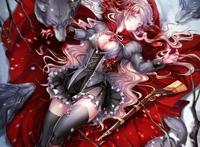18-The Curse of Yig(15)
Yig was a great god. He was bad medicine. He did not forget things. In the autumn his children were hungry and wild, and Yig was hungry and wild, too. All the tribes made medicine against Yig when the corn harvest came. They gave him some corn, and danced in proper regalia to the sound of whistle, rattle, and drum. They kept the drums pounding to drive Yig away, and called down the aid of Tiráwa, whose children men are, even as the snakes are Yig’s children. It was bad that the squaw of Davis killed the children of Yig. Let Davis say the charms many times when the corn harvest comes. Yig is Yig. Yig is a great god.
By the time the corn harvest did come, Walker had succeeded in getting his wife into a deplorably jumpy state. His prayers and borrowed incantations came to be a nuisance; and when the autumn rites of the Indians began, there was always a distant wind-borne pounding of tom-toms to lend an added background of the sinister. It was maddening to have the muffled clatter always stealing over the wide red plains. Why would it never stop? Day and night, week on week, it was always going in exhaustless relays, as persistently as the red dusty winds that carried it. Audrey loathed it more than her husband did, for he saw in it a compensating element of protection. It was with this sense of a mighty, intangible bulwark against evil that he got in his corn crop and prepared cabin and stable for the coming winter.
By the time the corn harvest did come, Walker had succeeded in getting his wife into a deplorably jumpy state. His prayers and borrowed incantations came to be a nuisance; and when the autumn rites of the Indians began, there was always a distant wind-borne pounding of tom-toms to lend an added background of the sinister. It was maddening to have the muffled clatter always stealing over the wide red plains. Why would it never stop? Day and night, week on week, it was always going in exhaustless relays, as persistently as the red dusty winds that carried it. Audrey loathed it more than her husband did, for he saw in it a compensating element of protection. It was with this sense of a mighty, intangible bulwark against evil that he got in his corn crop and prepared cabin and stable for the coming winter.
 杰佣r18车
杰佣r18车













![[NCT]18plus18 0.1大型团体群殴?](https://wimgs.ssjz8.com/thumbnail/2022/0408/154324_15951.jpg)
![[NCT]18plus18 0.1大型团体群殴?](https://wimgs.ssjz8.com/thumbnail/2023/0313/092036_86361.jpg)
![[NCT]18plus18 0.1大型团体群殴?](https://wimgs.ssjz8.com/thumbnail/2023/0313/141140_71421.jpg)
![[NCT]18plus18 0.1大型团体群殴?](https://wimgs.ssjz8.com/thumbnail/2023/0508/171645_537117.jpg)




![[NCT]18plus18 0.2](https://wimgs.ssjz8.com/thumbnail/2023/0214/170606_93314.jpg)
![[NCT]18plus18 0.2](https://wimgs.ssjz8.com/thumbnail/2023/0220/095005_60561.jpg)
![[NCT]18plus18 0.2](https://wimgs.ssjz8.com/thumbnail/2023/0322/143843_61032.jpg)
![[NCT]18plus18 0.2](https://wimgs.ssjz8.com/thumbnail/2023/0322/145537_36405.jpg)



